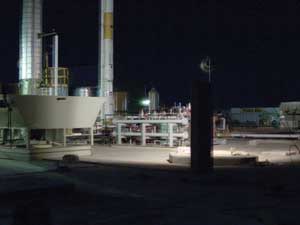Hydroprocessing goes small scale

August 19, 2009
BY Susanne Retka Schill
A prototype 3 MMgy hydroprocessing renewable diesel plant designed by Cetane Energy LLC of Carlsbad, N.M., will be duplicated at Sedgwick, Kan., this year. Healy Biodiesel Inc. is the first to license the hydroprocessing technology.
"It's all about feedstock flexibility and fuel quality," said Ben Healy, president of Healy Biodiesel. After a year of examining different new technologies, Healy signed with the New Mexico firm. "Cetane Energy's Gen II technology will allow us to break into markets never possible before with traditional biodiesel," he said. "We are also very impressed with the quality of fuel that Cetane's technology can put out on a consistent basis." Healy Biodiesel expects to begin the technology transition in November 2009, which will also expand its capacity from 1.2 MMgy when completed in April 2010.
Cetane Energy is the first to engineer hydroprocessing at a small scale, CEO Richard Aves said. "We had to spend a lot of time in scaling down the process, paying attention to the details in controlling reactions efficiently," Aves said.
In a simplified description of the process, hydroprocessing uses heat and pressure over a solid-state catalyst to break down the long carbon chains in fatty molecules, replacing oxygen bonds with hydrogen to make a hydrocarbon. Although hydroprocessing requires heat and pressure, it actually is energy efficient, Aves said, since in addition to producing renewable diesel the process generates natural gas, which in turn can be used to fuel the process. Depending on the cost of hydrogen, the process can be cheaper than biodiesel production, Aves added. About 90 percent of the production cost (not counting the feedstock itself) is in hydrogen costs, which can range between 30 cents and 80 cents per gallon of fuel produced. The capital cost for building a plant is estimated to range between 75 cents and $1 per gallon, according to Aves.
Since opening in April, the prototype plant at Carlsbad has produced about 250,000 gallons of renewable diesel by early August. An advantage for the biofuel is that since it is a hydrocarbon similar to petroleum-based diesel it has energy content equal to diesel fuel, and can be handled in existing infrastructure and diesel engines without modification. While biodiesel often sells at a discount to rack prices, Aves says the higher cetane rating between 70 and 80 should give renewable diesel at least a 10 cent premium over rack prices. "Right now we get rack price, but we think we're giving away value."
-Susanne Retka Schill
"It's all about feedstock flexibility and fuel quality," said Ben Healy, president of Healy Biodiesel. After a year of examining different new technologies, Healy signed with the New Mexico firm. "Cetane Energy's Gen II technology will allow us to break into markets never possible before with traditional biodiesel," he said. "We are also very impressed with the quality of fuel that Cetane's technology can put out on a consistent basis." Healy Biodiesel expects to begin the technology transition in November 2009, which will also expand its capacity from 1.2 MMgy when completed in April 2010.
Cetane Energy is the first to engineer hydroprocessing at a small scale, CEO Richard Aves said. "We had to spend a lot of time in scaling down the process, paying attention to the details in controlling reactions efficiently," Aves said.
In a simplified description of the process, hydroprocessing uses heat and pressure over a solid-state catalyst to break down the long carbon chains in fatty molecules, replacing oxygen bonds with hydrogen to make a hydrocarbon. Although hydroprocessing requires heat and pressure, it actually is energy efficient, Aves said, since in addition to producing renewable diesel the process generates natural gas, which in turn can be used to fuel the process. Depending on the cost of hydrogen, the process can be cheaper than biodiesel production, Aves added. About 90 percent of the production cost (not counting the feedstock itself) is in hydrogen costs, which can range between 30 cents and 80 cents per gallon of fuel produced. The capital cost for building a plant is estimated to range between 75 cents and $1 per gallon, according to Aves.
Since opening in April, the prototype plant at Carlsbad has produced about 250,000 gallons of renewable diesel by early August. An advantage for the biofuel is that since it is a hydrocarbon similar to petroleum-based diesel it has energy content equal to diesel fuel, and can be handled in existing infrastructure and diesel engines without modification. While biodiesel often sells at a discount to rack prices, Aves says the higher cetane rating between 70 and 80 should give renewable diesel at least a 10 cent premium over rack prices. "Right now we get rack price, but we think we're giving away value."
-Susanne Retka Schill
Advertisement
Advertisement
Advertisement
Advertisement
Upcoming Events





